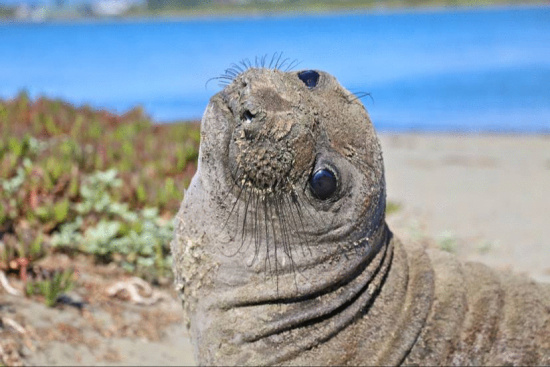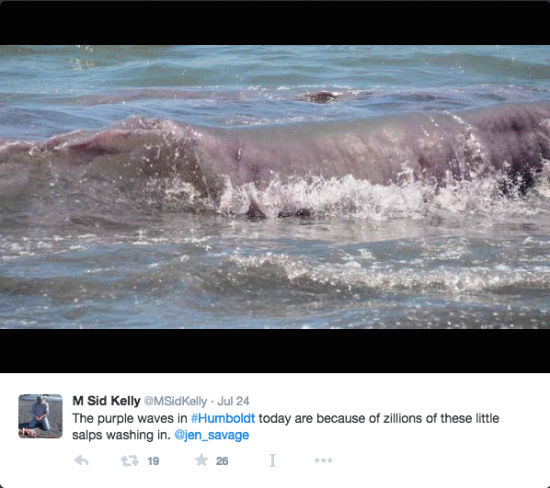This molting elephant seal seems to be doing just fine hanging out by the bay – but the Northcoast Marine Mammal Center is only a call away if you see a creature needing rescue. Support them through the Humboldt Bay Critter Crawl, Sunday, Aug. 2. By Andrew Goff.
Science and policy junkies, here’s your fix
First things first: So you’re all caught up on Facebook and Twitter and Instagram, and you have Reddit open in another tab, and you’re not sure if you should be reading Gawker any more anyway, and now it’s finally time for a mid-morning dessert: Ocean Acidification and Hypoxia.
Yes, the Ocean Protection Council – together with the Ocean Science Trust – hosts a public workshop today from 10 to 11:30 a.m. highlighting the West Coast Ocean Acidification and Hypoxia Science Panel’s work and exploring opportunities to consider their findings in ocean management in California – and beyond!
Join remotely via WebEx if you want vision along with your sound or dial into 1-(888) 942-7803 using access code: 514 235 6 if audio is enough to satisfy.
A literal coastal current (will help swimmers complete the Critter Crawl)
Remember how Mike What’s-His-Name left KHUM radio a couple weeks ago? Right. But Coastal Currents swims! Still on Wednesdays (today!), just at a new time, 2:30 p.m., with the amazing and delightful Larry Trask. (And me.)
Today’s topic, the Humboldt Bay Critter Crawl, which you will remember is a non-competitive open water swim benefitting local charities caring for wild and domestic animals. Tune in to find out how you can get involved or otherwise support both the swim and the Northcoast Marine Mammal Center.
#SwimmableCA
You love hashtagging your photos – #HumboldtCounty, amirite? – so take some shots of you or your people in the river, bay, whathaveyou, throw a #SwimmableCA on there from Friday, July 31 through Aug. 2 and win sweet prizes – designed to get wet – as part of the Waterkeeper Alliance’s dedication to, well, swimmable water! Details here.
Undercover poacher busters
“Don Powers was belly-down in high, wet grass, his head shrouded in camouflage and binoculars trained on a pair of divers in the cove 50 feet below, when he noted a detail that provoked his interest…”
So begins an excellent story by Mary Callahan in Sunday’s Press-Democrat, one which details the widespread and increasingly problematic red abalone poaching scene along the Mendocino and Sonoma coasts, and the drastic measures authorities are taking in response. Often acting on tips from private citizens or watchdog groups such as Mendocino Abalone Watch, wardens find themselves engaged in scenes reminiscent of espionage thrillers: “low-crawling through bushes, running through poison oak, hanging off the sides of cliffs…”
Well worth the read.
How international waters, modern slavery and Mittens’ Friskies are connected
Also extremely compelling – as mentioned last week, the New York Times is running an series, “The Outlaw Ocean” by Ian Urbina about crime on the almost completely lawless high seas. It’s fascinating, horrifying and something everyone who cares about 1.) human life; 2.) marine life; 3.) the ability for journalism to be powerful and change-invoking should read.
A sampling –
From ‘A Ship’s Trail of Crime’:
“Ships intentionally dump more engine oil and sludge into the oceans in the span of three years than that spilled in the Deepwater Horizon and Exxon Valdez accidents combined… and emit huge amounts of certain air pollutants, far more than all the world’s cars. Commercial fishing, much of it illegal, has so efficiently plundered marine stocks that the world’s population of predatory fish has declined by two thirds.”
From ‘Killing With Impuny’:
“…blood stains the blue water… A slow-motion slaughter unfolds over the next 6 minutes and 58 seconds… The oceans, plied by more ships than ever before, are also more armed and dangerous than any time since World War II…”
From ‘Slaves at Sea’:
“… crews trawled primarily for forage fish… Much of this catch comes from the waters off Thailand, where Mr. Long was held, and is sold to the United States, typically for canned cat and dog food or feed for poultry, pigs and farm-raised fish that Americans consume… Labor abuse at sea can be so severe that the boys and men who are its victims might as well be captives from a bygone era. In interviews, those who fled recounted horrific violence: the sick cast overboard, the defiant beheaded, the insubordinate sealed for days below deck in a dark, fetid fishing hold.”
From ‘The Longest Chase’:
“Industrial-scale violators of fishing bans and protected areas are a main reason more than half of the world’s major fishing grounds have been depleted and by some estimates over 90 percent of the ocean’s large fish like marlin, tuna and swordfish have vanished.”
BREAKING: Congress doing ‘nothing’
From North Coast Congressman Jared Huffman:
Last week, House Republicans brought a divisive and flawed water bill to the House floor that would do nothing to alleviate the effects of the drought. Instead, it’s yet another bill that harms West Coast fisheries and tribal interests, undermines state law, and micromanages the most complex water system in the world in a way that benefits a select few at the expense of many others across our state.
I led the effort to oppose this bill on the House floor.My Democratic colleagues and I offered more than 20 amendments in an effort to improve the bill — and ensure that it doesn’t hurt our region or the environment. However, nearly all were quickly rejected by the Republican Majority without even a vote.
After six weeks of unprecedented public input, I was proud to introduce the Drought Relief and Resilience Act based on ideas and feedback from nearly 1,000 Californians. People weighed in from San Diego to Crescent City, Fresno to San Francisco, as well as farmers, environmentalists, fishermen, urban and rural Californians, and water managers throughout the country.
A PDF of Huffman’s drought response bill can be found HERE.
WOWZA
Jennifer Savage serves as Coastal Programs Director for the Northcoast Environmental Center and chairs Surfrider Foundation’s Humboldt Chapter. All emphasis above is strictly hers.


CLICK TO MANAGE